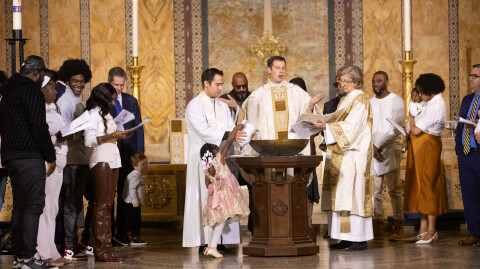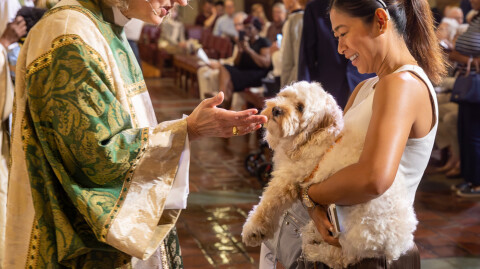As part of my Lenten practice this year, I’m reading The Amen Effect by Sharon Brous, the founding and senior rabbi of the IKAR community in Los Angeles. While I’ve only just started the book, I have already found so much wisdom in it. At its heart is the idea that being present with and for each other – basically, showing up – is really, really important. “Showing up can awaken us to one another’s humanity and our own, help us build more compassionate and resilient communities, and more purposeful and meaningful lives” (Brous, p. xx). Being together is essential for our emotional, physical, and spiritual well-being.
We have learned more than we ever wanted to know about loneliness and isolation during the pandemic, and now we can appreciate more deeply what a great gift it is to be able to gather together with family and friends, to gather together in worship, and how the simple act of being present with each other can actually shift our attitudes. On Thursday night, we welcomed Father Adam Bucko to St. Bart’s as part of the Contemplative Justice Series, A Different Kind of Fast. When Father Bucko led us in a brief meditation before the program began, I experienced again what a profoundly meaningful experience it is to sit in silence together. The same is true when we sing together, or pray together, or come to the Table together. Our individual experience is exponentially magnified when we show up together.
This Sunday, we will hear the Ten Commandments from the Book of Exodus (20:1-17). They read like a list of rather self-evident rules we must obey. We know some of them so well, we may have stopped paying attention to them: “You shall not murder.” “You shall not steal.” Well, obviously! But reading the Commandments again in the context of Brous’ book and after our time with Father Bucko on Thursday night, brings home the idea that these words, and many of our holy texts, can be read as guideposts for how we are to live together in mutual respect and in relationship with God. They are, as Brous writes, “a metaphor, a mirror, and a moral code to help us traverse the personal and social challenges we face today with rootedness, grace, and purpose” (Brous, xix). Sometimes, following those guideposts isn’t as easy as we think.
This idea of showing up for each other, of mutuality, of community, is at the core of our Christian faith. When we speak of the Body of Christ, we are talking about ourselves and each other joined together as one body, in one creation. As Paul wrote, “The eye cannot say to the hand, ‘I have no need of you,’ nor again the head to the feet, ‘I have no need of you’” (1 Cor 12:21). So, we show up. Our presence with each other is a spiritual practice. It is holy work.
I’ll be showing up on Sunday. I hope you’ll show up too!



